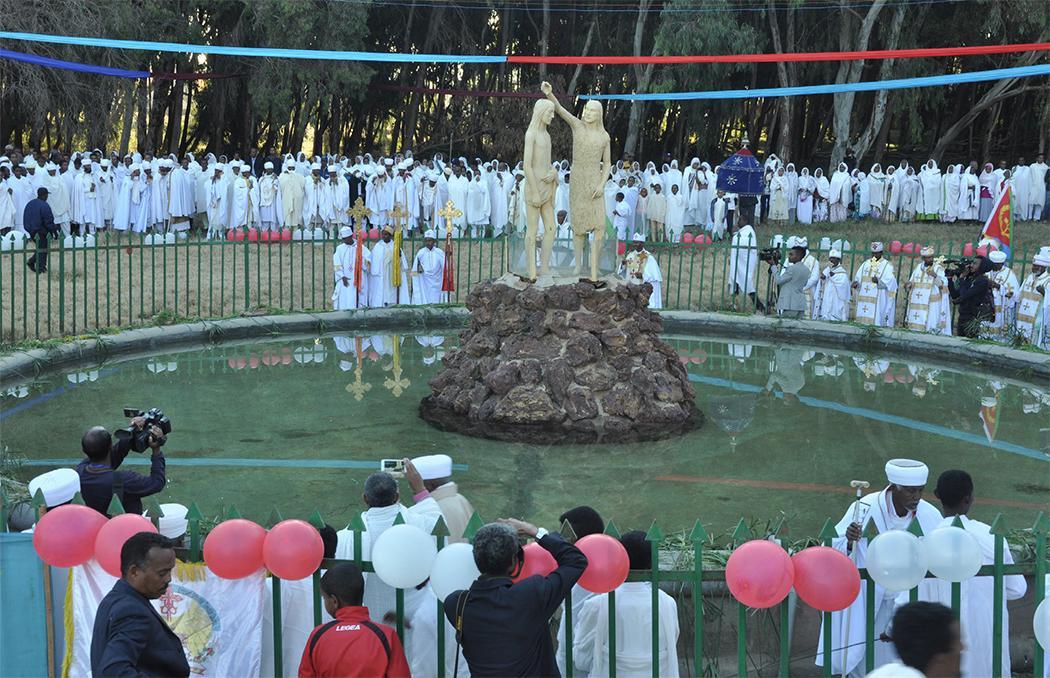Africa-Press – Eritrea. In Eastern Christianity, the word Timket, derived from Geez word Asteriyo, which means revelation, is associated with church’s theology that explains the revelation of the Trinity — the unity of God the Father, the Son and the Holy Spirit during the Baptism of Christ in the Jordan River.
On the other hand, in Western Christianity, Epiphany, also known as “Theophany”, commemorates how a star led the Magi, or the three kings, to the baby Jesus. The Magi represented the non-Jewish people of the world, so this was considered a “revelation to the gentiles.”
In the Western Church, Epiphany falls on January 6 while in the Eastern Church Timket is celebrated on January 19 and in leap years on January 20. This is because of the current 13-day difference between the Julian and the Gregorian calendars. Across several countries, Epiphany has been celebrated in different ways. In Spain, people exchange gifts, in Poland they hold a procession of the Magi, in Louisiana people bake cakes with hidden secrets in, and in Turkey they jump into freezing water.
In Eritrea, Timket is considered one of the significant religious holidays. At a national level, it is celebrated in Asmara and is often broadcast live on television. On Timket’s eve, known as Gehad, John the Baptist baptizing Jesus Christ (revelation), the Tabot of each and every church in Asmara is taken in a procession to where the celebration is held the next day. Tabot symbolizes the Ark of the Covenant and the tablets on which the Ten Commandments are inscribed. Adorned by shiny embroidered garment, it is always carried on the head of a priest.
Timket’s celebration begins early in the morning with colorful processions of choirs and priests, accompanied by crowds of people who finally congregate at May Timket, Bahti Meskerem square. The most prominent structure at May Timket is a statue of John the Baptist baptizing Jesus Christ in the middle of a fountain.
The ceremony is made colorful by chanting and dancing crowds in dazzling white traditional dresses, which contrast with the colors of the ceremonial robes and sequined velvet umbrellas of the priests.
Following Mass, ceremonial dances, and spiritual songs, the Patriarch of the Eritrean Orthodox Church dips a golden processional cross in the water to be blessed, and he then sprinkles some water on the faithful as a reminder of baptism.
By afternoon, all the Tabots return to the churches they have come from in the same procession they were brought with the priests and young people from different Sunday schools singing hymns.
After the official conclusion of the ceremony, another ceremony starts taking place. Most of the participants charge toward the fountain to fill their bottles with the holy water. The faithful take the holy water home and sprinkle their family members at home and their home with the water. The young also have fun using the water to wet their friends and people in their neighborhood.
Let me share my personal experience back when I was at the College of Business and Social Sciences. I can say I was one of the mischievous student. Only on Timket holiday, of course. As soon as the official ceremony was over, I would hurry back to my dormitory and take all the jerry cans I had filled with water the day before to empty them on my roommates and anyone I found on my way to the tap to refill the empty jerry cans. Good times! I can’t tell you how much I would like to redo everything and cherish every moment of my college life. Anyway, I keep them in my memories and always treasure them.
For More News And Analysis About Eritrea Follow Africa-Press







